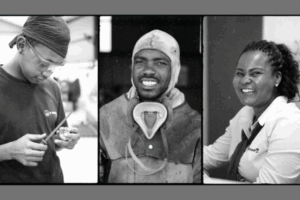Philasande Mthethwa (35) saw the signs that Orient Sun Clothing Company was heading for a bust. At 18, he joined the company, working under dangerous conditions along with 30,000 others in eSwatini’s textile industry in the early 2000s. But nothing prepared him for the abuse and exploitation at the garment factory. Philasande recalls the events that led him to pursue a career in unionism.
My current role as Industrial Field Officer and Organiser at the Swaziland Commercial and Allied Workers Union (SCAWU) is a far cry from how I started. I had to rely on myself from a young age, and even though I qualified for university, financial limitations led me to work at a Chinese-run textile factory.
In the early 2000s, eSwatini attracted foreign investment in the garment industry as part of its economic development strategy. However, garment factories are notorious for exploiting workers. Numerous reports highlight the impact of this foreign investment on workers and communities. I witnessed the elderly being punished and insulted by young Chinese supervisors daily. I endured physical assault from a manager for no reason.
The company had little union presence then. I argued that joining a union would make us stronger. When a shop steward position opened in my department, I applied and was elected. I was 19 years old. I took on the role with enthusiasm, holding meetings and rallying colleagues. Workers in other departments admired our approach, and at 20, I was elected chairperson of the 600-strong workforce.
Companies in many countries use every tactic to crush unions, and eSwatini is no exception. Without formal union training, I began to defend and win cases for workers. The management did not welcome our newfound solidarity. However, trade unionism had taken root. Two years later, I was elected to the National Executive Committee of the union.
At 23, I was fired for participating in a national protest action. Then the company vanished, which is common with ‘footloose garment investors’ in the region.
I joined the union as an employee tasked with establishing a regional office. Employers undermined me, calling me a ‘schoolboy‘ due to my slight build. But over time, I earned their respect. Despite these challenges, we succeeded in setting up the office and achieving better-than-expected results.
In 2013, several affiliates of the Trade Union Congress of Swaziland federation merged. My union was part of the merger, and I moved to the offices of SCAWU, the new retail union. The transition was rocky; the new union wasn’t registered, and there was infighting. For 18 months, I wasn’t paid. SCAWU leadership recognised my potential and offered me a role in 2015, which I accepted.
I faced initial skepticism from some shop stewards at SCAWU, but the General Secretary’s intervention turned things around. Now, three years later, I am excelling at SCAWU thanks to the support of my leaders and colleagues. I am also pursuing a Bachelor of Commerce degree this year to enhance my skills.
The conditions at work are deteriorating, making young workers ripe for organising. SCAWU’s executive committee includes young members who successfully attract their peers to the union. To recruit and retain young members, union organisers must address issues that resonate with them. Speak directly to these issues first, then rally them with slogans. Union officials should also upskill to serve an increasingly educated workforce.
To anyone aspiring to a career in this field: be selfless and passionate. Trade unionism is more than a career; it’s a calling. There are growth opportunities, but the right attitude is important. Prioritise the cause over financial gain. A money-driven union official is prone to bribery and is dangerous for the movement. Don’t seek favours from employers and resist bribes. Be disciplined, have principles, and be willing to learn from the veterans.







